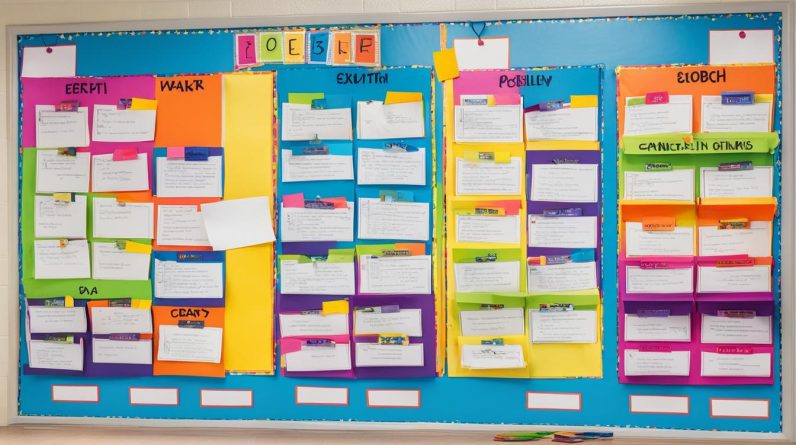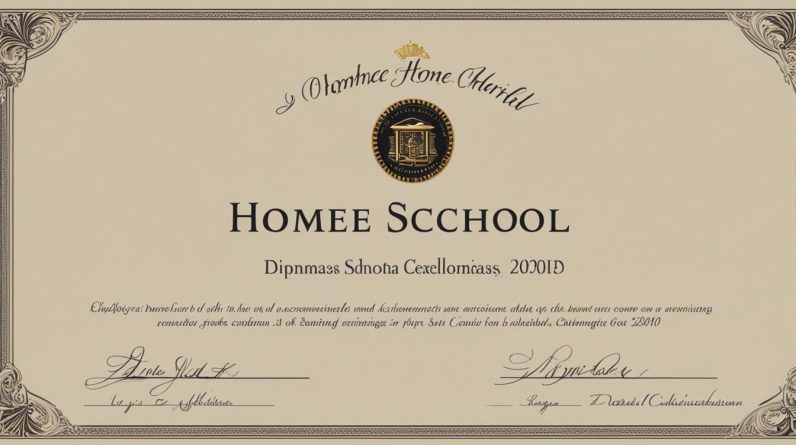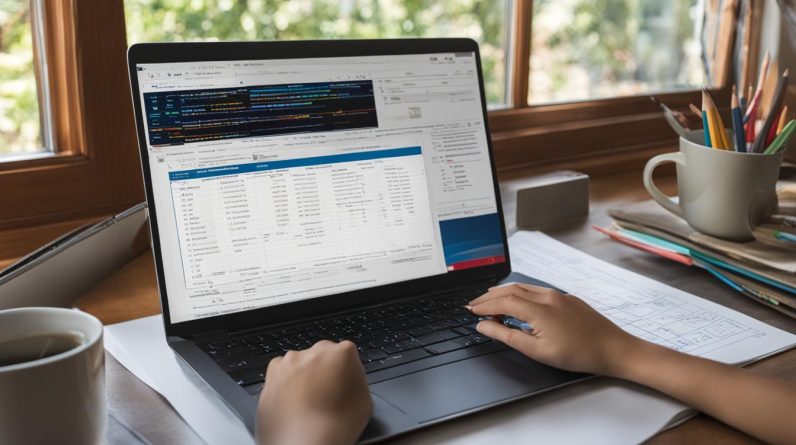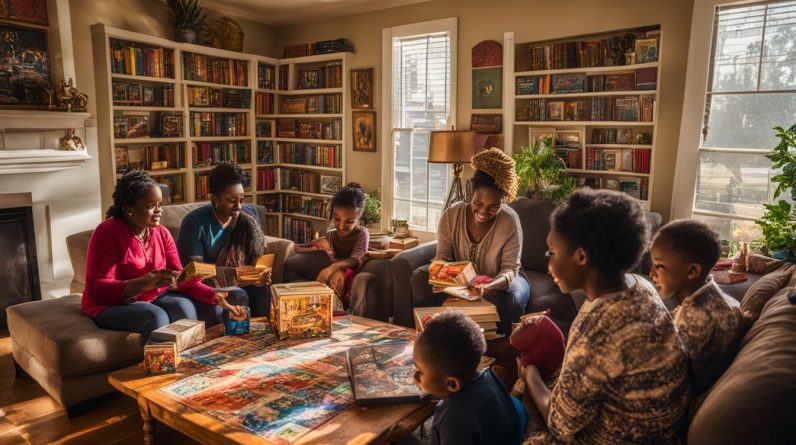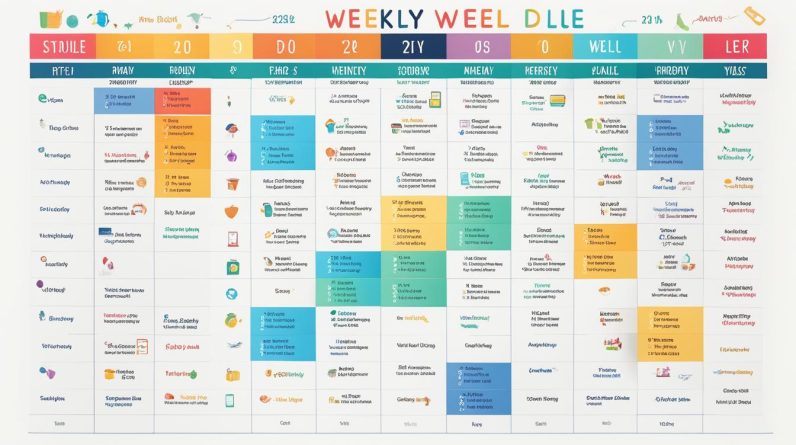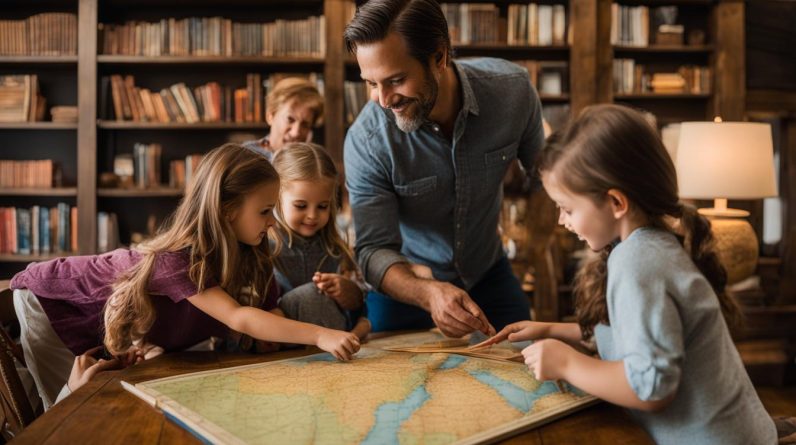Welcome to the world of home schooling in Minnesota! If you’re considering education at home for your child, it’s essential to navigate the homeschooling landscape with confidence and clarity. Minnesota offers a wealth of resources, laws, and support for parents who choose to educate their children at home. From understanding homeschooling curriculum and laws to finding homeschool groups and activities, we’ll guide you through the ins and outs of home schooling in Minnesota.
Key Takeaways:
- Minnesota Statutes, section 120A.22, covers home schooling in Minnesota.
- Parents must research and understand homeschooling requirements and philosophies.
- Complying with compulsory instruction laws and registration process is crucial.
- Explore different homeschooling curricula, techniques, and organizations for support.
- Minnesota offers a vibrant homeschooling community and numerous resources.
Getting Started with Home Schooling in Minnesota
When it comes to home schooling in Minnesota, it’s important to start off on the right foot. Understanding the process and complying with the state’s homeschooling laws are crucial steps for a successful homeschooling journey. In this section, we’ll guide you through the essential steps to get started with home schooling in Minnesota.
Research and Understanding
The first step in home schooling is to research and gain a solid understanding of what home schooling entails. Familiarize yourself with the different philosophies, curricula, and techniques used in homeschooling. Explore the available resources and organizations that provide support to homeschooling families in Minnesota.
Register Your Home School
Once you’ve decided to homeschool your child, it’s necessary to register your home school with the appropriate authorities. In Minnesota, homeschools are considered nonpublic schools. You’ll need to follow the compulsory instruction laws and register your home school with your local school district.
Explore Homeschooling Philosophies, Curricula, and Techniques
As a home school parent, you have the flexibility to choose the educational approach that works best for your child. Take the time to explore different homeschooling philosophies, curricula, and teaching techniques. This will help you tailor your child’s education to their unique needs and interests.
Find Local and State Homeschooling Organizations
Connect with local and state homeschooling organizations for valuable support and resources. These organizations provide a network of like-minded families and can offer guidance, advice, and socialization opportunities for your homeschooling journey. They can also help you stay informed about any changes or updates in homeschooling laws and regulations.
Difference Between Homebound Instruction and Homeschooling
It’s important to understand the difference between homebound instruction and homeschooling. Homebound instruction is designed for public school students who are temporarily unable to attend school due to illness. On the other hand, homeschooling is an independent form of education where parents provide instruction to their children at home. By recognizing this distinction, you can ensure that you are following the correct educational path for your child.
Explore Online Learning Options
In Minnesota, online learning is an option for homeschooling families. Online learning programs can complement your homeschooling curriculum and provide additional resources and support. Research the options available and choose the online learning program that aligns with your educational goals and preferences.
By following these steps and gaining a solid understanding of home schooling in Minnesota, you can embark on a successful and fulfilling homeschooling journey. Stay tuned for the next section, where we’ll delve into Minnesota’s compulsory instruction laws for homeschooling.
Minnesota’s Compulsory Instruction Laws for Home Schooling
When it comes to homeschooling in Minnesota, it’s important to understand the state’s compulsory instruction laws. Under Minnesota Statutes, section 120A.22 and 120A.24, all children between the ages of 7 and 17 are required to receive education either through a public or nonpublic school.
Your homeschool is considered a nonpublic school under Minnesota law, and as a parent, it is your responsibility to register your home school and comply with the requirements set forth by the state.
Here’s what you need to know:
Registering Your Home School
Before you can start homeschooling, it’s crucial to register your home school with your local school district. The registration process ensures that your homeschool is recognized as a legitimate educational institution and helps you comply with the compulsory instruction laws.
You’ll need to inform the superintendent of your local district about your intention to homeschool your child. The Minnesota Department of Education provides an Initial Registration Form for Unaccredited Nonpublic Schools, including Home-Schools, which you can use to report the required information. Alternatively, you can report the information in another manner as accepted by your district.
After the first year of homeschooling, you’ll also need to provide a Letter of Intent to Continue to Provide Instruction to update the superintendent about the status of your home school.
Legitimate Legal Exemptions
While homeschooling is a recognized form of nonpublic education, there are situations where you may qualify for a legitimate legal exemption to compulsory instruction.
It’s important to familiarize yourself with these exemptions to ensure you understand your rights and responsibilities as a homeschooling parent. If you believe you qualify for an exemption, it’s advisable to consult with legal counsel or contact the Minnesota Department of Education for guidance.
Amish Communities
It’s worth noting that Amish communities in Minnesota are not entirely exempt from the state’s compulsory instruction requirements. However, they do have the right to discontinue education, reporting, and testing following eighth grade.
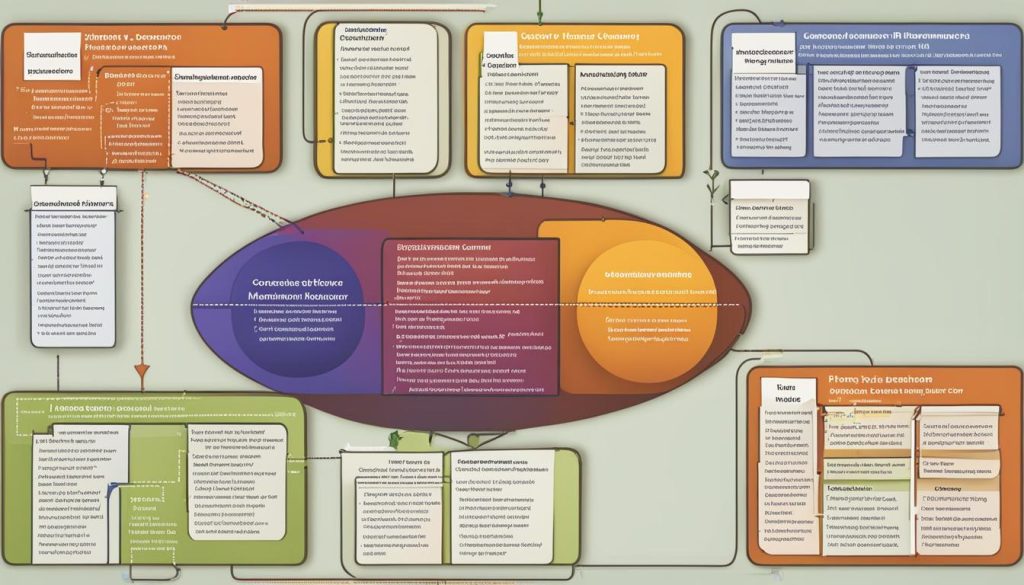
Difference Between Homebound Instruction and Home Schooling
When it comes to educating children at home, it’s important to understand the difference between homebound instruction and home schooling. While they both involve learning from home, there are distinct factors that set them apart.
Homebound Instruction
Homebound instruction is designed for full-time public school students who are unable to attend school due to illnesses or other medical conditions. In this case, a certified tutor or teacher is provided by the public school system to visit the student at home and deliver the required coursework. The goal of homebound instruction is to ensure that the student stays on track with their regular public school curriculum until they are able to return to school.
Home Schooling
On the other hand, home schooling is a form of private school education that takes place at home. It is a choice made by parents or legal guardians who assume the responsibility of providing instruction to their children. Home schooling allows flexibility in terms of curriculum and teaching methods, as parents can tailor the educational experience to meet the unique needs and interests of their child.
Unlike homebound instruction, home schooling is not affiliated with the public school system. Parents have the freedom to select a curriculum that aligns with their educational philosophy and objectives. They can choose from various homeschooling resources, materials, and programs to create a personalized learning experience for their child.

In summary, homebound instruction is specific to students who are temporarily unable to physically attend school, while home schooling is a deliberate choice for parents to educate their children at home. The table below provides a concise overview of the key differences between homebound instruction and home schooling.
| Homebound Instruction | Home Schooling |
|---|---|
| Designed for full-time public school students | Private school education at home |
| Tutor or teacher provided by public school system | Parents or legal guardians as instructors |
| Temporary solution for students unable to attend school | Long-term educational choice |
| Follows regular public school curriculum | Curriculum selected by parents |
Online Learning and Homeschooling in Minnesota
Online learning plays a significant role in the homeschooling landscape in Minnesota. It provides an avenue for students to receive a public education from the comfort of their home, with the involvement of parents or guardians. Public online learning programs in Minnesota offer a range of benefits, including:
- Free access to a public school curriculum
- Mandated tests aligned with the public school system
- Direct instruction and supervision by licensed Minnesota public school teachers
For homeschool students who wish to incorporate online learning into their education, there are options available. State-approved online learning providers offer part-time online learning programs for homeschool students, allowing them to complement their homeschool curriculum with online courses for an additional fee. Furthermore, private online learning programs offer a distinct pathway where parents can choose to pay tuition and utilize the online program as the core curriculum for their homeschooling journey.
Online learning provides homeschooling families with flexibility and access to a wide range of educational resources. It allows students to learn at their own pace while benefiting from professional guidance and support. Whether it’s leveraging public online learning programs or exploring private online learning options, incorporating online learning into homeschooling can enhance the educational experience.
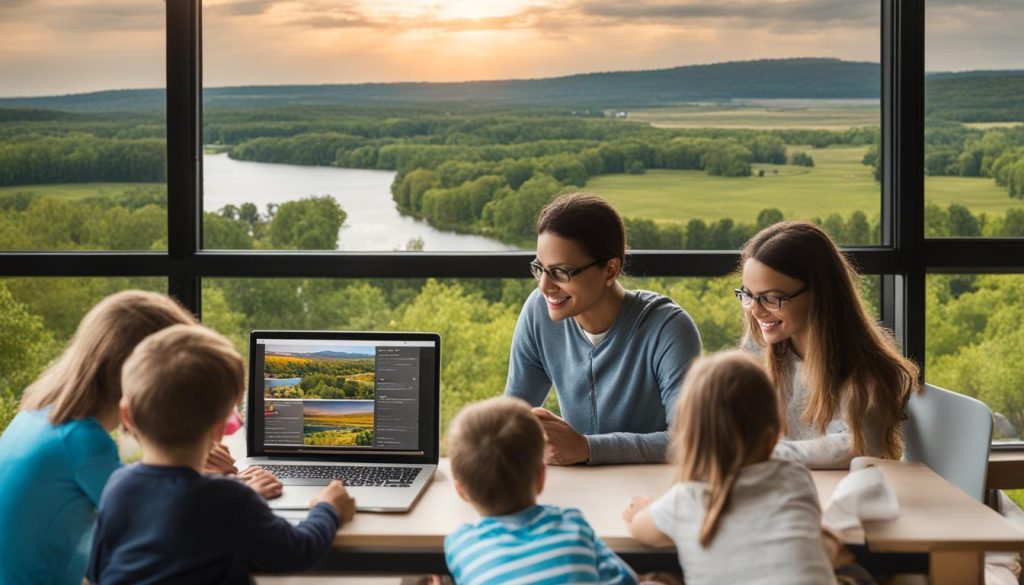
Public Online Learning Programs in Minnesota
“Online learning gives students the opportunity to access a public school education from the comfort of their own homes, offering flexibility and personalized instruction.”
Public online learning programs in Minnesota are designed to provide students with a comprehensive public school education while learning remotely. These programs offer a curriculum that aligns with the statewide standards and are taught by licensed Minnesota public school teachers. With online learning, students can explore a variety of subjects and engage in interactive lessons and activities.
Public online learning programs also ensure that students receive the necessary support and guidance to succeed academically. Licensed teachers provide direct instruction, virtual classrooms, and personalized assistance whenever needed. Students can participate in discussions, submit assignments, and ask questions while benefiting from the expertise and experience of their teachers.
Private Online Learning Programs for Homeschooling
“Private online learning programs offer a tailored educational experience that can complement homeschooling, providing curriculum options and individualized instruction.”
Private online learning programs cater specifically to homeschooling families who seek a structured curriculum and comprehensive instructional support. These programs offer a range of courses and resources to support homeschooling parents in delivering a well-rounded education to their children. Parents can choose from various subjects and grade levels, ensuring that the curriculum aligns with their educational goals and preferences.
Private online learning programs provide flexibility, allowing students to learn at their own pace. They often offer interactive lessons, multimedia resources, and assessment tools to track progress and reinforce learning objectives. With access to expert instructors and comprehensive curriculum options, homeschooling families can create a customized educational experience for their children.
The Benefits of Online Learning in Homeschooling
- Flexibility: Online learning offers flexibility in terms of scheduling, pacing, and location. Homeschool students can tailor their learning experience to their individual needs and preferences.
- Access to Resources: Online learning provides access to a wide range of educational resources, including virtual libraries, multimedia materials, and interactive learning platforms.
- Professional Guidance: With online learning, homeschooling students benefit from the expertise and guidance of licensed teachers, who provide instruction, support, and personalized feedback.
- Collaborative Opportunities: Online learning programs often facilitate collaborative activities and discussions, allowing students to interact with peers and engage in group projects.
- Supplemental Learning: Homeschooling families can utilize online learning programs to supplement their homeschool curriculum and explore additional subjects or areas of interest.
By incorporating online learning into their homeschooling journey, families in Minnesota can create a dynamic and personalized learning environment that meets the unique needs of their children.
Registering Your Home School with the Local District
Once you’ve made the decision to homeschool your children in Minnesota, it’s important to follow the proper procedures for registering your home school with the local district. This ensures that you comply with Minnesota’s homeschooling laws and regulations, and allows you to provide your children with a high-quality education at home.
To register your home school, you need to inform the superintendent of your local school district about your intent to homeschool your student(s). This can be done by using the Initial Registration Form for Unaccredited Nonpublic Schools, including Home-Schools, provided by the Minnesota Department of Education. Alternatively, you can report the necessary information in another manner as specified by your local district.
It’s also important to keep the superintendent informed about the status of your home school. After completing your first year of homeschooling, you must provide a Letter of Intent to Continue to Provide Instruction. This helps ensure ongoing compliance with Minnesota’s homeschooling requirements.
| Steps to Register Your Home School | Additional Information |
|---|---|
| Inform the superintendent of your local school district of your intent to homeschool. | The Minnesota Department of Education provides an Initial Registration Form for Unaccredited Nonpublic Schools, including Home-Schools, which can be used to register your home school. |
| Submit the necessary information to the superintendent. | You may need to provide details such as the names and birth dates of your children, your address, and the names of the instructors responsible for their education. |
| Update the superintendent after completing your first year of homeschooling. | Submit a Letter of Intent to Continue to Provide Instruction to ensure ongoing compliance with Minnesota’s homeschooling regulations. |
By registering your home school with the local district, you demonstrate your commitment to providing your children with a quality education while adhering to the legal requirements set forth by the state of Minnesota.
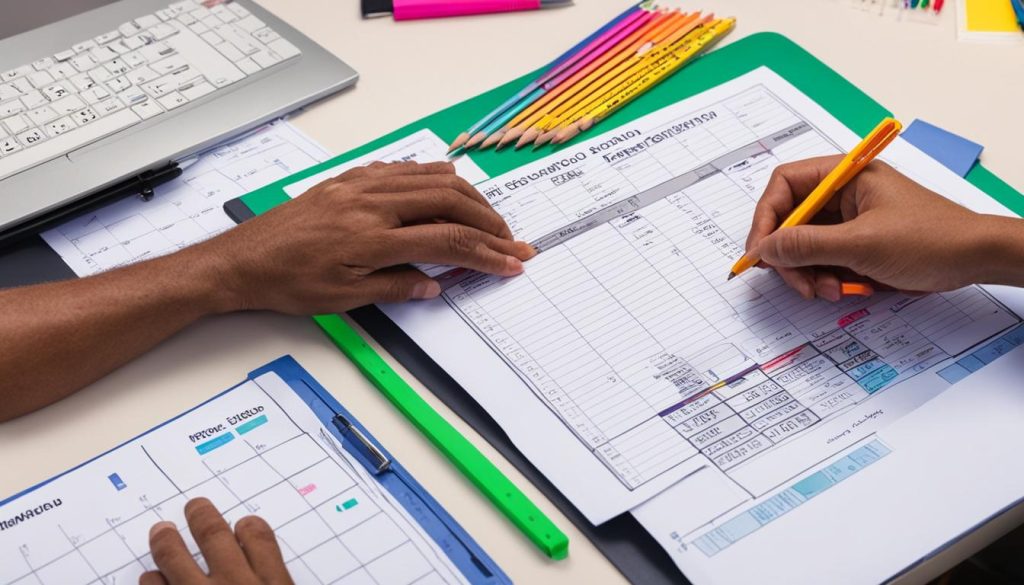
Compliance with Home School Law in Minnesota
When you choose to homeschool your child in Minnesota, it’s important to ensure compliance with homeschool laws to provide a legal education for your student. To ensure proper compliance, you must notify the superintendent of your local school district according to specific deadlines and provide relevant information about your homeschooling setup.
First, by October 1 of the first year your child is homeschooled, you must inform the superintendent of your local school district about your decision to homeschool. It’s essential to adhere to this deadline to ensure compliance with the law.
If you withdraw your child from public school or move out of your resident district during the school year, you must notify the superintendent within 15 days of the event. This notification allows the school district to update their records and adjust for your child’s absence.
Additionally, if you establish a new resident district, you must inform the superintendent of the new district by October 1 after the move. This ensures a smooth transition and continuity in your child’s education.
When notifying the superintendent, you’ll need to provide specific information to demonstrate compliance with homeschooling regulations. This includes:
- The child’s name, birth date, and address.
- The names of instructors who will be providing the education.
- Evidence of instructor qualifications.
- Information about annual examinations to assess your child’s progress.
- Statements regarding required childhood immunizations.
By providing this information, you ensure that your homeschooling efforts align with the requirements of Minnesota’s homeschooling laws. Remember, it’s crucial to keep your documentation up to date and comply with any future requests from the superintendent to maintain compliance and legitimacy as a homeschooling family.
Homeschooling Qualifications for Instructors in Minnesota
Instructors in a homeschool setting must meet specific requirements in Minnesota in order to comply with the homeschooling laws. These qualifications ensure that instructors are equipped to provide a quality education to their children. The homeschooling qualifications in Minnesota include:
- Hold a valid Minnesota teaching license: Instructors must possess a valid teaching license in the field and grade level that they are teaching.
- Be directly supervised by a person holding a valid Minnesota license: Instructors must have direct supervision from someone who holds a valid teaching license in Minnesota.
- Successfully complete a teacher competency examination: Instructors must pass a teacher competency examination to demonstrate their knowledge and proficiency in teaching.
- Hold a baccalaureate degree: Instructors should have a bachelor’s degree in their area of instruction.
- Be the parent, guardian, or legal custodian: Instructors can meet the qualifications if they are the parent, guardian, or legal custodian of the child and follow the assessment procedures outlined in Minnesota Statutes, section 120A.22, subdivision 11.
By meeting at least one of these qualifications, instructors can ensure they are in compliance with the homeschooling laws of Minnesota.
Required Subjects and Curriculum for Homeschooling in Minnesota
When homeschooling in Minnesota, it is important to ensure that your curriculum covers the required subjects outlined by the state’s homeschooling laws. By incorporating the following subjects into your homeschooling program, you can meet the legal requirements and provide a well-rounded education for your child:
- Basic communication skills: This includes reading, writing, and language proficiency, which are vital for effective communication and comprehension.
- Literature and fine arts: Explore the world of literature, poetry, and the arts to foster creativity and appreciation for various forms of expression.
- Mathematics and science: Develop your child’s analytical and problem-solving skills through the study of mathematics and scientific concepts.
- Social studies: Covering history, geography, economics, government, and citizenship will help your child understand the world around them and become informed global citizens.
- Health and physical education: Promote physical well-being and an active lifestyle by incorporating health education and physical activities into your curriculum.
By incorporating these subjects into your homeschooling curriculum, you can ensure that your child receives a comprehensive education that aligns with Minnesota’s homeschooling laws.
Design Your Curriculum
“Education is not the learning of facts, but the training of the mind to think.” – Albert Einstein
Designing your homeschool curriculum allows you to tailor the content and approach to your child’s unique learning style and interests. Consider your child’s strengths, weaknesses, and goals when selecting resources and materials for each subject. Utilize textbooks, online courses, educational websites, workbooks, educational games, and hands-on activities to create a well-rounded and engaging learning experience.
Don’t forget to take advantage of the many educational resources available online, such as virtual museums, interactive learning platforms, and educational videos. These resources can supplement your curriculum and provide additional opportunities for exploration and discovery.
Remember, the key to an effective homeschooling curriculum is flexibility. Adapt and modify your plans as needed to cater to your child’s individual needs and interests.
Recommended Resources for Homeschooling Curriculum
| Subject | Recommended Resources |
|---|---|
| Basic Communication Skills | Phonics Foundations by Reading Eggs, Grammar Galaxy, Handwriting Without Tears |
| Literature and Fine Arts | Sonlight Curriculum, Teach Art at Home, Meet the Great Composers |
| Mathematics and Science | Singapore Math, Beast Academy, Mystery Science, Khan Academy |
| Social Studies | Story of the World, National Geographic Kids, Time for Kids, Scholastic’s Study Jams |
| Health and Physical Education | PE Central, Kids Health, GoNoodle, Yoga Ed |
Remember, this table is not exhaustive, but it provides a starting point for exploring recommended resources for each subject. Don’t hesitate to explore additional options that align with your child’s interests and learning style.
By incorporating the required subjects into your homeschooling curriculum and utilizing recommended resources, you can provide your child with a well-rounded education and ensure compliance with Minnesota’s homeschooling laws.
Support and Resources for Homeschooling in Minnesota
Minnesota has a thriving homeschooling community that provides extensive support and resources for families who choose to educate their children at home. Whether you are new to homeschooling or a seasoned homeschooler, there are various organizations and groups that can offer guidance, information, and support to help you on your homeschooling journey.
Statewide organizations like the Minnesota Homeschoolers Alliance and the Minnesota Association of Christian Home Educators are valuable resources that can connect you with other homeschooling families, provide access to educational events and workshops, and offer support in navigating the homeschooling laws and requirements in Minnesota.
In addition to statewide organizations, there are also local homeschool groups and co-ops that provide opportunities for socialization and collaboration among homeschooling students. These groups often organize field trips, group activities, and special events, creating a sense of community and offering valuable learning experiences outside of the home environment.
Furthermore, Minnesota offers a wide range of field trip ideas and educational resources specifically tailored for homeschoolers. From museums and historical sites to nature centers and cultural institutions, there are countless opportunities to supplement your homeschool curriculum with hands-on learning experiences that enrich your child’s education.
FAQ
What is home schooling?
Home schooling is a form of education where parents or legal guardians provide instruction to their children at home, following a curriculum of their choice.
What are the compulsory instruction laws for home schooling in Minnesota?
In Minnesota, home schools are considered a type of nonpublic school. Parents must register their home school and comply with the requirements of Minnesota Statutes, section 120A.22 and 120A.24, or qualify for a legitimate legal exemption to compulsory instruction.
What is the difference between homebound instruction and home schooling?
Homebound instruction is for full-time public school students with illnesses that confine them to home. Home schooling, on the other hand, is private school at home, where parents or legal guardians provide instruction to their children at home.
What is online learning in Minnesota?
Online learning in Minnesota most often refers to a form of public education that takes place at home, usually with parent/guardian involvement. Public online learning programs provide free public school curriculum, direct instruction, and supervision by licensed Minnesota public school teachers.
How do I register my home school with the local district?
To register a home school in Minnesota, parents must inform the superintendent of their local school district of their intent to home school their student(s). They can use the Initial Registration Form for Unaccredited Nonpublic Schools, including Home-Schools provided by the Minnesota Department of Education, or report the information in another manner.
What are the qualifications for instructors in a homeschool setting in Minnesota?
Instructors in a homeschool setting must meet specific requirements in Minnesota. They must hold a valid Minnesota teaching license in the field and grade level taught, be directly supervised by a person holding a valid Minnesota license, have successfully completed a teacher competency examination, hold a baccalaureate degree, or be the parent, guardian, or other person having legal custody of a child who is assessed according to the procedures outlined in Minnesota Statutes, section 120A.22, subdivision 11.
What are the required subjects and curriculum for homeschooling in Minnesota?
Homeschooling in Minnesota requires instruction in certain required subjects, including basic communication skills, literature and fine arts, mathematics and science, social studies including history, geography, economics, government, and citizenship, and health and physical education. Parents must ensure that their curriculum covers these subjects to comply with Minnesota’s homeschooling laws.
What support and resources are available for homeschooling in Minnesota?
Minnesota has a thriving homeschooling community with many support and resources available for homeschooling families. Statewide organizations such as the Minnesota Homeschoolers Alliance and the Minnesota Association of Christian Home Educators provide guidance, information, and support to homeschooling families. There are also local homeschool groups and co-ops that offer social and educational opportunities for homeschooling students. Additionally, Minnesota offers a wide range of field trip ideas and educational resources for homeschoolers to enhance their learning experience.

